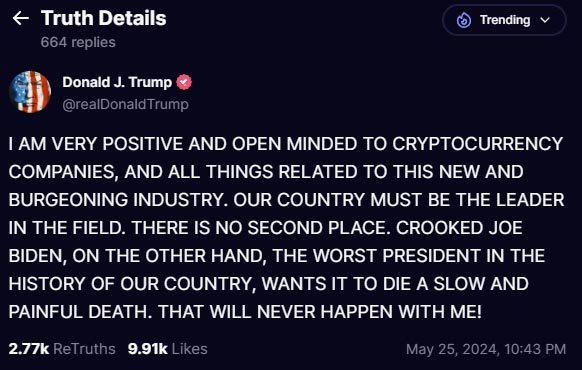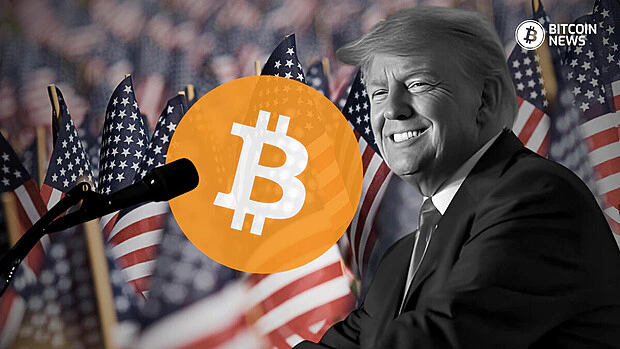In a surprising turn of events, former President Donald Trump has become a vocal supporter of digital assets, a stance that marks a significant shift from his earlier skepticism.
As he campaigns for the 2024 presidential election, Trump has made clear his intentions to champion the burgeoning Bitcoin industry, positioning himself as a pro-Bitcoin candidate in stark contrast to current President Joe Biden.
Interestingly, back in 2021, Trump expressed his distrust of digital assets, arguing that the world’s currency should be the dollar and suggesting that Bitcoin and other digital currencies should be heavily regulated.
However, as the 2024 election approaches, Trump has radically changed his tune, now voicing strong support for the sector.
In a post on his social media platform, Truth Social, Trump has articulated his newfound enthusiasm for the industry:
“I am very positive and open minded to cryptocurrency companies, and all things related to this new and burgeoning industry.”

Trump’s embrace of digital assets is not just rhetorical. His campaign has begun accepting donations in bitcoin and other digital assets, a move designed to appeal to the community.
Supporters can now contribute using various digital currencies, including BTC, ether, Dogecoin, and others through the Coinbase Commerce product. This initiative is part of Trump’s broader strategy to tap into the enthusiasm of Bitcoin proponents and to diversify his campaign’s funding sources.
The campaign announcement tied President Biden to one of Bitcoin’s most vocal critics, Senator Elizabeth Warren, who has been described as building an “anti-crypto army.”
Trump’s campaign framed the acceptance of bitcoin donations as a stance against “socialistic government control” over U.S. financial markets, hoping to position Trump as a defender of financial freedom.
Trump’s pro-Bitcoin stance was prominently featured in his speech at the Libertarian Party’s National Convention.
This unusual move for a presumptive Republican nominee underscores his effort to court Libertarian voters, who traditionally advocate for minimal government intervention and support for individual liberties, including financial autonomy through Bitcoin.
“If you vote for me on day one I will commute the sentence of Ross Ulbricht, he’s already served 11 years. We’re gonna get him home,” Trump promised during his speech at the convention.
Ulbricht, the founder of the Silk Road online marketplace, is serving a life sentence for his involvement in the darknet site where bitcoin was used for illegal transactions.
Many Libertarians view Ulbricht as a martyr, and Trump’s promise to commute his sentence was met with mixed reactions of boos and cheers from the audience.
Trump also pledged to appoint Libertarians to his Cabinet and other senior administration posts, further indicating his commitment to integrate Libertarian principles into his policy framework.
A significant part of Trump’s digital-asset campaign rhetoric involves attacking President Biden’s stance on the industry. Trump has accused Biden of wanting to “kill” the U.S. Bitcoin industry, saying Biden aims for Bitcoin and other digital assets “to die a slow and painful death.”
This combative stance aligns Trump with a sector of the electorate that feels marginalized by current regulatory attitudes toward digital assets.
The community has been particularly vocal about their opposition to what they perceive as overregulation following the implosion of the FTX exchange and the subsequent fraud conviction of its founder, Sam Bankman-Fried.
Trump’s pivot to support Bitcoin has significant political and economic implications. This market, although used by a relatively small fraction of the electorate, has a considerable influence on U.S. politics due to the substantial financial resources and the passionate advocacy of its supporters.
According to Politico, digital asset firms and groups are preparing to spend over $80 million in the 2024 elections.
As Trump continues to campaign, his pro-Bitcoin stance is likely to remain a central theme. By embracing the industry, he aims to attract a new cohort of voters who are enthusiastic about financial innovation and skeptical of heavy-handed regulation.










